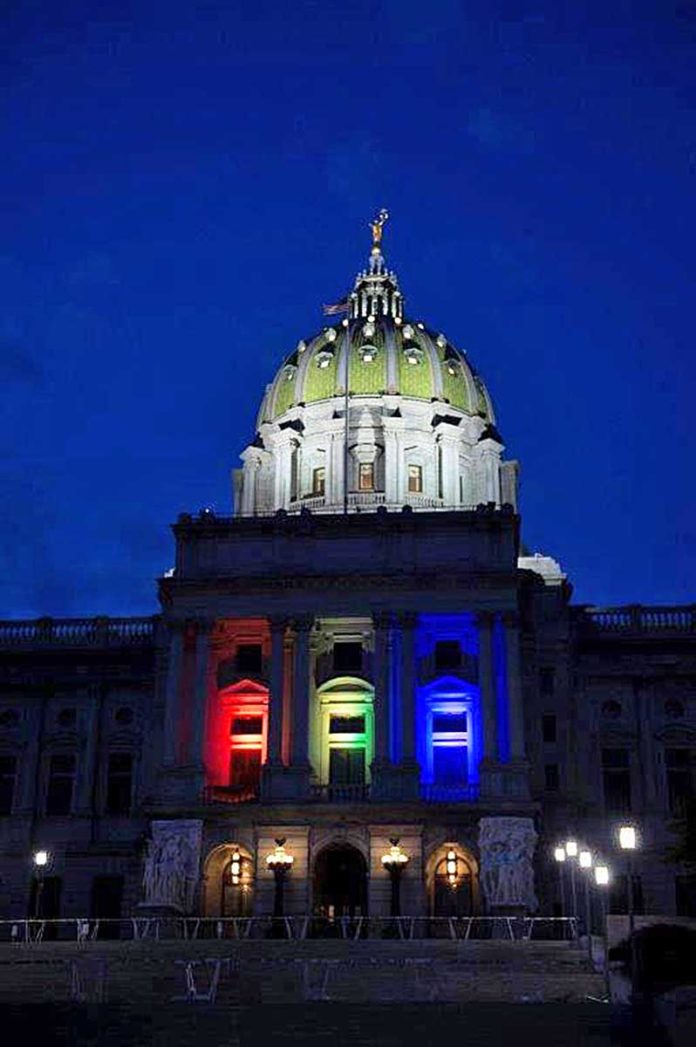Amid a tumultuous year that has seen an ongoing pandemic and a nationwide fight for racial justice, the Pennsylvania legislature seems, if not out of touch, at least out of sync with what is happening outside its insular space in Harrisburg. With 253 members, the PA General Assembly is the second-largest state legislature in the nation and the largest full-time legislature. It is also a Republican stronghold, with all the attendant problems that brings for women, people of color and LGBTQ people.
While other state legislatures are busy dismantling symbols of racism and doing other progressive actions, the PA legislature has been battling Gov. Tom Wolf on the state shutdown system that has kept the state’s number of coronavirus cases at half that of neighboring New Jersey, despite Pennsylvania having a significantly larger population.
On June 8, a group of Black Democrats in the house commandeered the podium at the start of the day’s session to demand action on police reform. The action by the group lasted 90 minutes and included the unfurling of a banner reading “Black Lives Matter.”
Rep. Malcolm Kenyatta (D-Phila.) was among the leaders of the protest. He said, “We’re going to stay here until you act. This is our moment to say, ‘Enough is enough.’”
One Republican lawmaker, Rep. Russ Diamond (R-Lebanon), said he and fellow Republicans did not support the protest. Diamond said, “The way to get bills heard is to draft them properly, bring them before the House and hold a majority.”
Then-Speaker Mike Turzai (R-Allegheny) described himself as a “60 year old white man,” and said, “We live in challenging times. I understand silence is not the answer for what is happening.”
The action wasn’t even reported on in the Philadelphia news market.
No action has been taken since the protest.
That the legislature has failed to step up during this historic moment is no surprise. Progressives in the state and particularly in Philadelphia have been frustrated for years by the stasis in Harrisburg and Republicans’ attitudes on social, economic and environmental issues.
That nothing has come of the protest runs parallel to the fact that the PA Assembly has a dismal record of reaching anything close to racial parity with Pennsylvania state demographics. Only 11 percent of those 253 seats are held by Black, Latinx or Asian house and senate members, nearly all from Philadelphia or the near suburbs. This is an even more glaring deficit as the middle of the state is increasingly expanding its Latinx and Asian populations and immigration issues are pivotal.
It’s equally unsurprising that there are only two openly gay state representatives, both of whom are from Philadelphia. In 2012, Brian Sims, 41, became the first-ever openly gay candidate to be elected to the state house. In 2018, Kenyatta, 28, made history as the first openly gay candidate of color to win a state house primary in Pennsylvania.
In November, Daniel Smith, 44, a self-described former life-long Republican turned Democrat will challenge open homophobe Daryl Metcalfe for the 12th district seat. Smith was recently given a spotlight endorsement by the Victory Fund, which works to elect LGBTQ people to all levels of government.
Metcalfe, 57, has held the seat since 1999. Throughout that time, he has made local and national headlines for his egregiously homophobic statements and has a long history of proposing anti-LGBTQ legislation. He and Sims have had several Twitter fights, with Metcalfe referring to Sims as a “lying homosexual,” among other things.
The Pittsburgh Post-Gazette has called Metcalfe the most conservative member of the PA legislature — a description he embraces, noting in an interview with the Philadelphia City Paper that he “was a Tea Partier before it was cool.”
Sims and Kenyatta have been among the strongest voices in the state house in recent years and have been vocal in calling out other state reps on a range of issues.
On May 27, Sims accused then-Speaker Turzai of hiding the COVID-19 diagnoses of Republican representatives with whom Sims, who donated a kidney last year, had been in committee. Sims called for Turzai’s resignation. (Turzai resigned June 15, unrelated to the incident. He had been Speaker since 2015 and in office since 2001.) Kenyatta also spoke out on the issue, noting that Black people are at higher risk for the coronavirus. Turzai and house Republicans ignored that and have made no outreach on the coronavirus to minority populations during the pandemic.
Kenyatta has also been a strong motivator on LGBTQ issues. In May,
Republicans sponsored a bill to designate shooting ranges and sportmans clubs as life-sustaining businesses and provide guidelines for their re-opening. Kenyatta added an amendment which would have made it illegal for sportsmans clubs to discriminate against employees on the basis of age, race, sex, religion, ethnic origin, economic status, sexual orientation, gender identity or expression or disability.
Kenyatta’s amendment (now superseded by the Supreme Court decision in Bostock) would have created the first Pennsylvania law to extend such protections to gender identity and sexual orientation. The amendment failed by only two votes, with seven Republicans crossing party lines to join a unanimous Democratic caucus in supporting the measure.
While lawmakers like Kenyatta and Sims are shaking things up in Harrisburg, so much more needs to be done — including electing more people of color and other minorities, like Smith.
With Republicans holding a significant majority in the house and senate, they can continue to refuse changes Democrats suggest. But as Kenyatta’s very close vote suggests, there may be room for change. And the November elections may hasten that change.
